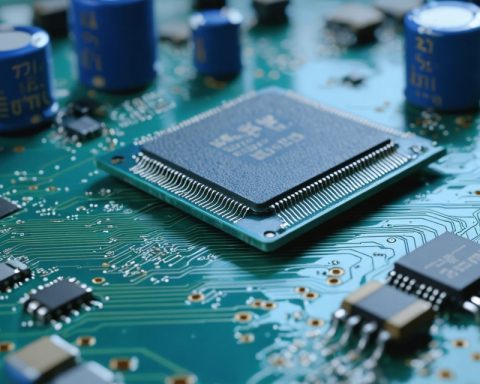Stocks of several leading quantum computing companies suffered significant losses, plummeting over 40% on Wednesday following a pivotal statement from Nvidia’s CEO, Jensen Huang. Speaking at the influential CES trade show in Las Vegas, Huang shared a sobering outlook on the timeline for “very useful quantum computers,” estimating that we are likely two decades away from seeing their true potential materialize.
The market reacted sharply to Huang’s projections. Companies like Rigetti Computing and IonQ saw their stocks nosedive by approximately 49% and 47%, respectively. Similarly, D-Wave Quantum and Quantum Computing Inc. witnessed declines of nearly 48% and 50%.
Despite the downturn, the quantum computing sector had enjoyed a strong performance through late November and December. Innovations were fueling optimism, with tech giants like Amazon and Google making significant strides. Amazon introduced a quantum computing advisory program to prepare AWS customers for the impending advancements, while Google unveiled the promising Willow chip, enhancing power while addressing error concerns.
Earlier this year, a supportive move from the U.S. government saw bipartisan senators propose a $2.7 billion boost for quantum research. This followed successful initiatives by companies such as IonQ, which integrated Nvidia’s quantum developer kit, and Quantum Computing Inc., who made advances in quantum software.
Even with the recent setbacks, companies like Quantum Computing Inc. have seen significant gains over a six-month period, indicating renewed long-term interest. Nvidia also remains actively engaged with numerous quantum firms, extending its CUDA software kit to accommodate quantum software development.
Nvidia CEO’s Prediction Sends Quantum Computing Stocks Tumbling: A Deep Dive into the Market and Future Prospects
The quantum computing sector faced a dramatic shake-up as several leading players experienced significant stock losses, plummeting over 40%, following a pivotal statement by Nvidia’s CEO, Jensen Huang. At the renowned CES trade show in Las Vegas, Huang delivered a sobering forecast, suggesting that the realization of “very useful quantum computers” could be as far as two decades away. This announcement punctured the booming optimism that had been surrounding the industry.
Market Reaction and Emerging Trends
Huang’s projections triggered rapid market responses. Companies such as Rigetti Computing and IonQ saw their stocks dive nearly 49% and 47%, respectively. D-Wave Quantum and Quantum Computing Inc. weren’t spared either, experiencing losses close to 48% and 50%. Despite this downturn, the industry had enjoyed a positive trajectory through the latter part of 2022, driven by groundbreaking innovations and strategic investments from tech giants like Amazon and Google.
Prior to this setback, Amazon had launched a quantum computing advisory program to prepare AWS customers for future developments. Google, meanwhile, introduced its promising Willow chip, which improved computational power while addressing prevalent error concerns in quantum computing.
Government Support and Industry Resilience
In a bid to bolster quantum innovation, a bipartisan group of U.S. senators proposed a $2.7 billion funding boost for quantum research earlier in the year. This follows successful initiatives from companies like IonQ, which successfully integrated Nvidia’s quantum developer kit to enhance their research capabilities. Similarly, Quantum Computing Inc. advanced its quantum software capabilities, exemplifying the continuous progress within the field.
Despite recent market volatility, Quantum Computing Inc., among others, has reported significant gains over a six-month horizon, indicating sustained investor interest and potential for long-term growth. Nvidia continues to play a critical role in this ecosystem by extending its CUDA software to support quantum software development, emphasizing its commitment to the quantum landscape.
Future Predictions and Industry Insights
Looking forward, the quantum computing market faces intriguing prospects. Even with Huang’s projections of a twenty-year timeline for fully realizing the potential of quantum computers, ongoing investments, and sustained interest from technology leaders underscore a continued belief in the sector’s transformative power.
The industry’s current challenges may act as catalysts for driving further innovation and investment, paving the way for breakthroughs that could redefine computing as we know it. Companies and investors alike are poised to navigate this evolving landscape, balancing immediate market reactions with the anticipation of long-term technological advances.
Whether Huang’s timeline proves accurate or not, the pursuit of quantum supremacy remains a central tenet among tech pioneers and government entities. As the field evolves, staying abreast of new developments and preparing for future opportunities will be key for stakeholders across the board.



















